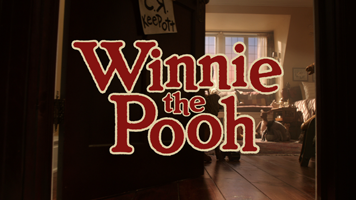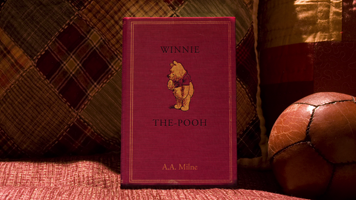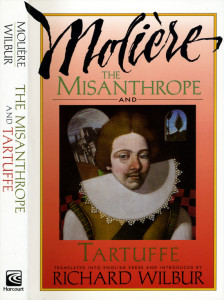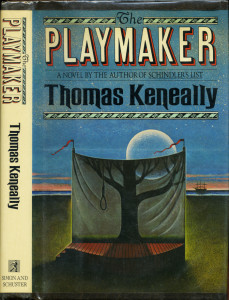
BROOM Given our project, this is a fascinating artifact. Don’t you think? It’s surprising that they made this movie and distributed it to theaters. Surprising for several reasons, some of which are critical and some of which are just historical. The effort to do honor to the old values and old properties of Disney, and the effort to make it up-to-date — which together were so dissonant and such a failure — felt indicative of where things are in 2011, culturally. When earlier movies made attempts to recapture “the old Disney,” I had the cynical sense that they just didn’t know how anymore. Now it’s like they so utterly don’t know how anymore that they’re very specifically doing an entirely different thing in its place.
ADAM [dubious ‘tude take] “O-kay…?”
BETH I think the choice of Zooey Deschanel to be the singer is indicative of the attitude they were taking toward this: “Let’s be twee! This is Winnie the Pooh, it’s inherently twee, so let’s play that angle! Christopher Robin is like the perfect hipster kid!”
BROOM Are you saying that about Christopher Robin’s portrayal, or the portrayal of his bedroom?
ADAM His bedroom was awfully steampunk.
BROOM It was like Zooey Deschanel album art.
BETH It was like the Wes Anderson version of Christopher Robin’s bedroom.
BROOM Where did we get this couch from?
BETH Room and Board.
BROOM It was like that.
BETH I don’t know how to take what you’re saying.
ADAM Well, I happen to have Zooey Deschanel right here… I haven’t thought of my meta-criticism yet, but can we talk about how dull it was?
BROOM Very dull.
BETH It was 53 intolerable minutes. Except for the Backson song on the chalkboard, which was obviously their “Pink Elephants” moment.
ADAM They were obviously bored, because they had these two — not just one, but two — flight-of-imagination fantasy sequences.
BETH Two Dumbo moments.
BROOM The second one was more like Alice in Wonderland.
ADAM That was obviously all that was getting them through the day. There were eight people credited for story in this movie. The original Winnie the Pooh movie was three different stories from the original books. This one was kind of a mashed-up version of two or three different stories, but they didn’t really fit together.
BROOM The thing with Eeyore’s tail is a story; the thing with them making a trap for something —
ADAM The heffalump.
BROOM — is a story. The idea of “The Backson” being something that got Christopher Robin, because he wrote “back soon,” is something.
ADAM The thing where they make tracks around a tree and then they get freaked out by them… I think that had been in the first movie already.
BETH Ugh.
BROOM The movie was dull because it had no flair, no charm, and the animation was very pedestrian.
BETH The animation sucked. It was Saturday morning cartoon shit.
BROOM It looked like one of those straight-to-DVD movies. You know, like Sleeping Beauty 3: Beauty’s grandchildren are having trouble with their pets!
BETH That’s why it was hard to believe it was released in theaters.
BROOM It all felt like the straight-to-DVD production package. Which would make sense of it. Maybe that’s what it was produced to be, and then they decided “hey, let’s put this one in theaters.” I don’t know.
ADAM Did the first movie have all those typography-interaction jokes, too?
BETH I think it did.
BROOM In a much milder way.
ADAM It had a couple.
BROOM I thought the first Winnie the Pooh movie was okay, but Adam, you thought it was unacceptable. You complained that they had made Winnie-the-Pooh an asshole, that they had completely betrayed the charming childlike spirit of the originals. And I thought you were overstating it a bit. But here everything you said seemed to me true.
ADAM Actually, this time I thought the characters’ personalities were closer to what I recall from… I won’t say the books, but from the Saturday morning cartoons.
BROOM It was like the Saturday morning cartoons, in which the characters’ personalities were nothing like in the books.
ADAM Winnie-the-Pooh was sort of self-centered here, but he did still seem like the Winnie-the-Pooh of the books.
BROOM He was like Homer Simpson here! His honey dream was like Homer Simpson going to the land of chocolate.
BETH But don’t you think that Jim Cummings did a great impression of Sterling Holloway?
BROOM Yes! I was impressed.
BETH That was my favorite part: marveling at how well he did the voice.
BROOM I think he’s the same guy who did it in the 80s and 90s on the cartoon show. But all the other voices were terrible! I mean, Craig Ferguson as Owl was terrible, the Rabbit guy was terrible…
ADAM The Tigger guy was okay.
BETH No.
BROOM No. The original Tigger had a great voice!
ADAM I don’t know, I’d have to watch them side by side.
BROOM And I don’t think what you say about the characters was true at all. The strength of the first movie is its really rich character animation. Rabbit is kind of a Bert, kind of a curmudgeonly nerd, and Owl’s pomposity is real and internalized, it’s not just a thin veneer on an idiot. And Piglet is meek and honorable, he’s sort of like Linus, whereas here he was just, like, They Killed Kenny.
ADAM They all had pretty unappealing personalities, it’s true.
BROOM They didn’t really stick to character consistently, either. Why did we have to see Rabbit doing a bunch of ninja shit and everyone putting on helmets and doing a montage of military cliches? And Piglet doing Indiana Jones, or whatever that was…
BETH Yeah, it was Indiana Jones.
BROOM It’s this really offensive desperate grabbing at other stuff.
BETH I feel like that one was an in-joke, because it was very quick…
BROOM “In” for whom?
BETH For the animators. “We’re so bored that let’s put an Indiana Jones reference in this.”
BROOM Then they’re so lame! Did you guys sniff Chicken Little behind this at all? Because I did. I had that sense.
ADAM It wasn’t as bad as that.
BROOM No, it wasn’t, it was much better than Chicken Little, but I had that sense of nerd-world.
BETH I wasn’t thinking of it that way.
ADAM I mean, I see what you’re saying, now. Like, Chicken Little is Piglet.
BROOM This Piglet. If you asked, in 2011, what property Disney should make into their next movie, nobody would have said “they should make a Winnie the Pooh movie in the spirit of the 70s one.” It seems so completely not to fit with the times.
BETH I was thinking, what age of child would accept this?
ADAM This seemed to be for very little children.
BETH Very little, like three- or four-year-old kids.
ADAM It was so boring. And all of the gestures towards, like, “Cowabunga!” were not enough to make even six-year-olds want to watch this.
BROOM What age were we when we watched the Winnie the Pooh TV show? Seven or eight, right? You just accept stuff, on Saturday morning. I checked in with that part of my brain a couple times: “If I was just watching this while I ate cereal, would it be fine?” And the answer was: “… yeah, basically.” But here’s something that I wouldn’t have liked even if I was just eating cereal: Winnie-the-Pooh’s honey wet dream is gross and creepy. Like, honey is gross. That he eats it with a full fist has always been gross. It’s bright yellow, it’s putrid, and he sticks his fist into this opaque yellow honey and it goes all over his face, this has always been gross, and then they went and made a whole world of it.
ADAM It’s true.
BROOM And he swam in it. He would be drowning. It was awful.
ADAM And the physics didn’t work at all. He went into the pot and it oozed out, but then actually the level was like a foot below that.
BROOM Those psychedelic things — when I was a kid, it would be like, “wow, this is heady stuff… if everything was honey, how would you, like… sleep?” I’d start wondering “if he goes off that way, would he go forever? And it would still be honey?” That’s what a kid gets into, and in this scenario, the answers to all those questions were horrific. And the fact that Pooh was just reveling in all that horror shows how unsympathetic he is.
BETH I don’t agree with that!
ADAM I remember as a kid watching the Yellow Submarine movie — do you remember “Nowhere Man,” where they’re in that blank space?
BROOM Yes, that’s the epitome of what I’m talking about.
ADAM It actually did trouble me as a child.
BROOM I think it was supposed to, there. I feel like Winnie-the-Pooh’s real honey fantasy ought to have been him in his cozy house, surrounded by all the honey he wants, because he’s like a little British child who wants sweets. Not some kind of Yellow Submarine hallucination…
BETH That’s for the animators, again, because they wanted to play.
BROOM It’s just a wrong move. Like everything else here.
ADAM It all feels like the Finance department. Some business school graduate was like, “What properties haven’t been sufficiently monetized?” And then they were like, “Okay, I guess we can squeeze some more out of this.” And then the animators were like, “What?”
BROOM Well, that’s the purely cynical explanation. I was saying, I think there’s some other kind of thinking at work too, in, say, the Zooey Deschanel thing. “Hipsters really like the innocence of childhood. The innocence of childhood really appeals to people right now, it’s really in. But we have to put a little bit of Go the Fuck to Sleep edge on it.”
ADAM Peter Rabbit on a skateboard!
BROOM When the animation first kicked in and the music started, and it was clearly twee-ified — “Let’s Get Quirky!” or whatever that SNL skit is — I thought, “Oh, I see! Might this possibly work?” And then 20 seconds in I thought, “I don’t think it’s gonna work.” And then there were 54 minutes left.
BETH It’s sad that that was the second to last movie.
BROOM Well, they’ll go on! Life goes on.
BETH I know.
BROOM “It’s sad that this is the present day,” you could say.
ADAM This is Barack Obama’s America.
BETH We’ll have to address that in a wrap-up conversation.
ADAM I don’t know that this necessarily reflects just the degradation of the culture — though surely it does, to some extent — but also, it’s trying to work within this, like, wheezing tradition…
BROOM That’s what I’m saying about straight-to-DVD. If you went to visit Eddie, and they were like, “we bought him this stack of DVDs,” and it was like, The Legend of Tinkerbell…
ADAM I’m sorry, you mean Tinkerbell: Pixie Hollow Games.
BROOM Very good, Adam! And whatever the others are: Lady and the Tramp 2, Lady and the Tramp 3, Oliver and More Company, whatever these things are. If you watched one, you’d think, “yeah, I kind of expected it to look like this.” Like a Saturday morning cartoon that goes on a little long, and is cheery, and has second-rate songs.
BETH And jokes.
BROOM And that’s what this was. It’s just that in this series, we keep saying, “this is what they’re making for kids now?” In fact they’re making all sorts of different crap for kids now.
ADAM Surely this had the lowest box office of any Disney animated movie in the last few years.
BROOM Nobody remembers this movie having happened.
BETH I don’t think they promoted it very much.
BROOM Not on the same scale. Basically, it’s strange that it’s on this list. It’s on a different scale.
BETH It doesn’t feel like it belongs.
BROOM And we’ve said that a couple other times. What are the other times?
ADAM Make Mine Music.
BROOM That’s right, in the 40s.
BETH There were 70s ones that felt out of place, too.
BROOM The first Winnie the Pooh, which was a compilation of shorts. And The Rescuers Down Under had that same feeling of “You didn’t really mean that, did you?”
ADAM Why are shorts so boring? If this had been three shorts I would have been even more annoyed.
BROOM Some shorts are good. All right, you want an answer? I think they appeal to a different kind of attention — more of a you’re-eating-cereal attention — which lasts for about eight minutes, happily. You think: “look at that! look at that! look at that!” And then after eight minutes, you think: “Why? Why is this still going on?” And a short can’t answer that question, because it wasn’t built to answer that question. And that’s what was so annoying about this script; that’s why there were all those story people working on it. They wanted to keep the feeling of episodic shorts, but to also have a long arc.
ADAM By which we mean that Pooh’s stomach has to disgustingly growl for 45 minutes.
BROOM Things that we liked: I liked that he sang a duet with his growling stomach.
BETH I did too. I was ready to be charmed based on that song.
BROOM I was already disturbed that the faces were so inexpressive, by the time that song kicked in. The first Winnie the Pooh has that sketchy, 101 Dalmatians look, where you see the pencil lines, and it has a real artistry to it. If Owl turns around and thinks, there’s a lot of cared-for character in every aspect of it. Here it had that dull, flat, spiritless quality. Rabbit was the only one with any skill to it, and then I saw it was done by Eric Goldberg. He’s one of the few names I know anymore; he’s been there a long time.
ADAM I like that Christopher Robin sounded like Kate Middleton’s sister.
BROOM You said something like “It’s Hermione!” That was how he sounded, like baby Daniel Radcliffe. “We found a kid who has a delightful English voice! And no acting skills!”
ADAM [horrible English accent]: “It’s so broad! Et was sewwww brawwwwd!” It didn’t sound like any English person that I’d ever met. It sounded like an English socialite who — you know those girls with the fascinators at the royal wedding? That’s how I imagine they talk.
BROOM Other things we liked?
ADAM …No. Nothin’.
BETH The beginning, I guess. When you said you liked how it looked already, at the very very beginning, I thought, “Yeah, this is nice.”
ADAM You liked that they got the original Pooh doll out of the Victoria & Albert museum?
BROOM They clearly didn’t.
ADAM They said they did.
BROOM The original Pooh doll looks like a ratty little thing, it doesn’t look like this Pooh at all.
BETH Can I say something I really didn’t like? When his stomach suddenly burst open and stuff started coming out! What was that??
BROOM It was disturbing. That’s an element in some of the stories that his fluff comes out and he needs more fluff, but for them to throw it in for just one second like that was like Alien.
BETH It was really upsetting to me.
ADAM Do we think this has any larger social implications than just “Things fall apart; the center cannot hold”?
BROOM You know, we watched a lot of shitty cartoons as kids. We didn’t think twice about whether the center was holding. If we watched an episode of Gummi Bears now, we’d go: [deadpan] “Wow. I really hope those bad guys don’t get the Gummiberry juice to the castle.”
BETH This was better than Gummi Bears.
ADAM It’s true; I went back and watched some Different Strokes the last time I was at the Museum of Television and Radio. They were all really bad. I think the trouble is just when you work in an emaciated form.
BROOM Feature animation?
ADAM Well, Disney feature animation has all these constraints and baggage around it.
BROOM This didn’t really live up to any of those constraints.
ADAM I agree with you, but wouldn’t it have been better if they had just said, “We’re making Howl’s Moving Castle.” Or “We’re making the first Pixar movie,” which was not beholden to anything. And you can already sense now that the Pixar movies start to feel like they’re kind of straitjacketed by expectations. But that was not the case with the early ones.
BROOM Do you think that’s an artistic reality? Or just an reality imposed by the suits?
ADAM I think it’s a partially artistic, partially commercial reality.
BETH I think it’s self-imposed by the animators by what they see works, and what they get accolades for.
BROOM That’s what I thought was going on here. I thought this project had plenty of room, within it, for so much more artistry than they brought.
ADAM You need infusions of fresh blood from outside the form. Part of why Little Mermaid works and seemed like a rejuvenation is because it has this unabashed Broadway thing. And you’ll see that the next one has this unabashedly Pixar-y thing that makes it feel, you know, livelier.
BROOM Even though that is now a 20-year-old thing.
ADAM But it’s the high-low cross, in this case. Where Disney is the high and Pixar is the low.
BROOM I don’t think anyone sees it that way. I think it’s more like “I’m an Apple and I’m a PC.”
ADAM Fine, if you want. Old money, new money. But wouldn’t it be cool if they did a Disney movie that had, like, a Japanese anime infusion in it?
BROOM That was what Atlantis was supposed to be. That didn’t work.
ADAM Well, more stylishly than that. Like, someone who had actually seen a Japanese anime more than once.
BROOM Yes, I do.
ADAM Or what if they let, like, Chris Ware art direct a Disney movie?
BETH During the sequence of the Backson chalkboard animation, I thought, “You could just make a whole movie that looks like this. Maybe you should, because that would be more fun than what we’re watching. And who’s stopping you?” Maybe the suits. But maybe the artists too. It’s not even on the table.
BROOM I like what I’m hearing here. I’m always looking for how to be a better conservative, because they’re essentially conservative, but you’re saying “be radical.” And yeah, it would be great if they were radical.
ADAM Yeah. Some Mary Blair, some something. This just seemed like running on fumes.
BROOM Do you think it has to do with hiring practices? Because who was Mary Blair? Just some artist that they hired. It’s not like they were desperate for fresh blood; it was just part of who they had on staff. Now they hire these people who went to CalArts expressly to be able to do the thing. There truly was the sense of no ideas here, right?
ADAM and BETH Yes.
BROOM As a given. As the baseline. This is why we’re holding up Lilo and Stitch, which is, you know, okay.
ADAM Not that great.
BROOM But we were excited because it seemed like someone had an idea. Just putting watercolors in the background of that movie washed out your eyes: Ah! Something!
ADAM Yeah. I agree. This seemed like it had no possible non-corporate motivations.
BROOM Just a few days ago Beth and I watched, for my second time, the Wallace and Gromit feature-length movie, Curse of the Were-Rabbit. It’s cute. And in the making-of material, someone says that he admires the movie because, quote, “You can’t write charm.” Charm is about sensitivity to all these little touches, and to create something that runs on charm takes great care. And they had done that. I absolutely agree; that’s what makes those Wallace and Gromit movies work: they care about all the things that add up to charm. And that’s what Winnie the Pooh is supposed to be! And it was like they gave it to, you know, swine.
BETH The animators didn’t relate to that.
BROOM I thought the background artists did okay. In emulating the style of the original illustrations.
BETH It’s an easier task. Because you don’t have to draw character.
ADAM I think this was the writers’ fault, primarily.
BROOM I think the fault was spread around pretty evenly.
ADAM Why would you take it upon yourself to rewrite this material? It’s like, “More Alice! Let’s do more stuff with Alice!”
BROOM Alice Down Under! Alice in Space! Alice Planet!
[we read the New York Times review]
ADAM I imagine that if I had had to review Piglet’s Big Movie, I would have been similarly grateful for this.
BROOM It does give some perspective. All right, comparatively, this was a valiant effort to return to quality. But this is what I’m saying about classy conservatism. So sad that this is the classy version. Also, this mention of the jokes with the typography reminded me that I wanted to say: I didn’t like the payoff that they climbed out of the hole on the letters of the book. That joke doesn’t make sense within the scheme of the movie. It’s just stuff. It isn’t satisfying or meaningful or clever.
ADAM They totally forgot about the jump rope, by the way. You’re right, this is better than, like, The Cat in the Hat. You remember that?
BROOM The live-action one, with Mike Myers?
ADAM Yeah. It could be worse. It could clearly be worse.
BROOM Yes, all kinds of things can be worse than other things.
ADAM But the fact that this was bad even though they were trying to, you know —
BROOM First world problems, guys. First world problems.
BETH I have nothing else.
BROOM Here’s something important to say: one left. One left.
ADAM [drum roll sound]


